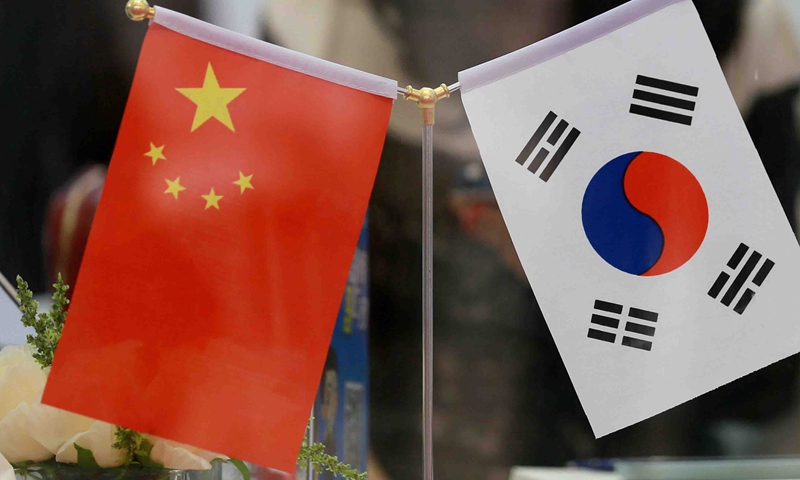China, S.Korea actively promoting 2nd phase FTA negotiations shows increasing mutual political trust: expert

China South Korea File photo:CGTN
The Ministry of Commerce of China and the Ministry of Trade, Industry and Energy of South Korea Friday held a meeting of chief negotiators for the second phase of free trade agreement (FTA) negotiations, with an expert on Saturday saying that this shows the increasing mutual political trust between the two countries despite current discord, and will have an optimistic effect on trade liberalization and multilateralism.
China and South Korea conducted further consultations on trade in services and investment rules, and market opening in the negative list mode with negotiations making positive progress, Chinese Ministry of Commerce said on Friday in a release on its website.
“Promoting the early substantive results of their negotiations will further enhance the level of liberalization and facilitation of services trade and investment between China and South Korea,” Dong Xiangrong, a senior research fellow at the National Institute of International Strategy under the Chinese Academy of Social Sciences (CASS), told the Global Times on Saturday.
“It will also strengthen their cooperation on technical trade barriers, intellectual property rights, and the fight against the COVID-19 pandemic, particularly in terms of biological technology, such as RT-PCR tests, vaccine research and production,” she said.
The negative list, which came into effect in China on January 1, 2020, is a management model of foreign investment that allows industries not on the list to be open for investment in all businesses and does not require pre-approval by Chinese government agencies.
According to the Xinhua News Agency, for the first time, the negative list has been introduced into the services trade and investment negotiations between China and South Korea on their free trade agreement (FTA) in 2019.
Dong pointed out that China and South Korea maintain very important bilateral relations with close economic ties. Although discord exists regarding politics, regional security and culture between the two countries, their mutual political trust has been strengthening in recent years.
“For example, the South Korean government, instead of politicizing the coronavirus, adopted a scientific and pragmatic attitude to deal with the pandemic, and the two countries approved the ‘fast-track’ entry system between them,” she noted, adding that the moves maintained the stability of the industrial and supply chains and even bilateral economic ties, becoming an example of international cooperation on pandemic control and prevention.
Most recent data shows that China remains South Korea’s largest trading partner in 2020 despite the onslaught of the COVID-19 pandemic, while the latter is the former’s third. Their trade volume reached $285.26 billion in 2020.
Dong indicated that “in the past, the trade structure between China and South Korea was mainly complementary. Due to the rapid development of China’s economy, their trade relationship has developed into a complex relationship of complementarity and competition. China competes with South Korea in many fields, such as information technology, shipbuilding, steel, automobile and smart phones.”
“Despite the complexity, China and South Korea’s active promotion of closer bilateral economic and trade cooperation will further enhance the stability and integration of the industrial and supply chains in East Asia, as well as play a positive role in supporting free trade and multilateralism,” she noted.
The China-South Korea FTA came into effect in 2015, and the second phase of FTA negotiations were jointly announced by the two sides in December 2017. At present, they have conducted seven tariff reductions, and the coverage rate of zero tariff trade volume exceeds 55 percent of their trade in total, Chinanew.com reported Friday.
